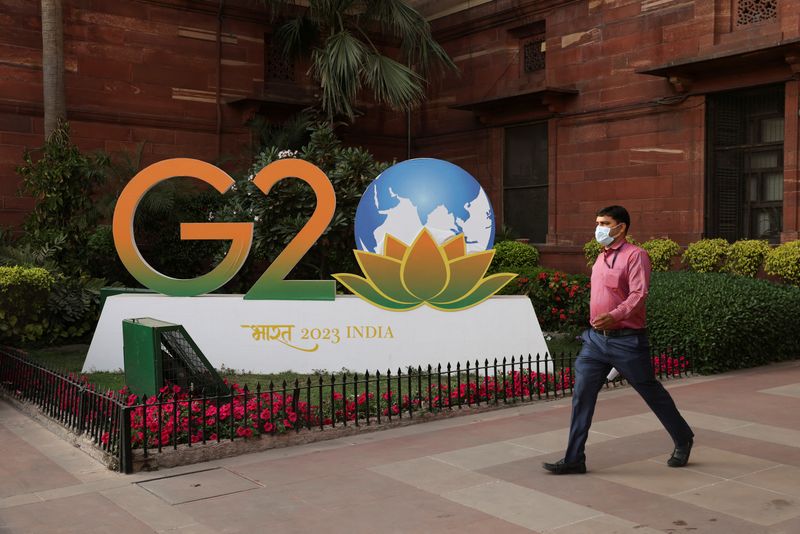IMF sees ‘pockets of resilience,’ slowing momentum in global economy
2023.07.13 07:57

© Reuters. FILE PHOTO: A man walks past a model of G20 logo outside the finance ministry in New Delhi, India, March 1, 2023. REUTERS/Anushree Fadnavis
By David Lawder
WASHINGTON (Reuters) – The International Monetary Fund said on Thursday that first quarter global growth slightly outpaced projections in its April forecasts, but data since then has shown a mixed picture, with “pockets of resilience” alongside signs of slowing momentum.
The IMF said in a briefing note for a G20 finance leaders meeting in India next week that manufacturing is showing weakness across G20 economies and global trade remains weak, but the demand for services is strong, particularly where tourism is recovering.
The IMF did not indicate any changes to its April 2023 global GDP growth forecast of 2.8% – down from 3.4% in 2022 – but said that risks were “mostly” tilted to the downside. These include the potential for Russia’s war in Ukraine to intensify, stubborn inflation and more financial sector stress that could disrupt markets.
But the Fund said that inflation “seems to have peaked” in 2022, and core inflation, while also easing, remains above targets in most G20 countries.
Reduced supply chain disruptions and lower goods demand means likely disinflationary pressures from goods, the IMF said.
“However, services inflation – which is now the major driver of core inflation – is expected to take longer to decline,” the IMF said.
Strong consumer demand for services, buoyed by demand, buoyed by strong labor markets and the post-pandemic shift in spending from goods to services, is likely to sustain these price pressures, the IMF said.
“On the upside, a softer-than-projected landing for output and labor markets is possible, with activity remaining resilient, inflation falling faster than anticipated and labor markets cooling through fewer vacancies rather than more unemployment,” the Fund added.
INFLATION FIGHT
G20 policymakers should continue their fight against inflation, tightening monetary policy in many economies and maintaining real rates above neutral until “tangible signs of inflation returning to target emerge.”
But the IMF said policymakers will need to be vigilant for signs of financial sector stress, especially those brought about by interest rate risk and property sector stresses, and may need to deploy financial policy tools to contain them. It called for “granular stress tests” for financial firms.
G20 countries also need to tighten fiscal policy to ensure debt sustainability, create fiscal space and to help support disinflation by reducing aggregate demand, the Fund said.
IMF Managing Director Kristalina Georgieva said in an accompanying blog post that her “overriding priority” was to complete a review of the IMF’s quota resources that would increase their overall size, “with mindfulness of how the global economy has evolved”, a signal that major emerging markets like China should see increased shareholding.
The Fund last adjusted its shareholding in 2010, and is working to complete a review by Dec. 15.
SUBSIDY ADVICE
The IMF also warned G20 countries about the dangers that industrial policy can have in creating distortions in trade and investment, citing China’s industrial subsidies and those for green energy investment in the United States and the European Union.
“Such policies create the risk of fragmentation of production and of triggering retaliatory responses by trading partners,” the IMF said. “These could also hamper technological diffusion, both between major technological hubs and to developing economies.
Instead, it called for G20 countries to “develop common perspectives on the appropriate use of subsidies,” adding that this can help improve outdated World Trade Organization rules and help avoid a fragmented global economy.








